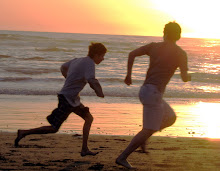They're friends of the prince, the king's cousin, that wiry, little young man always in a baseball cap. You'll see him at the charity runs waving a sign to start the race, and if you didn't know who he was you'd think, 'how cartoon-like that boy is." But the friends of the prince are another matter. They're serious looking, tall, always striding, and supercilious young men. They make fun of everything. And they are always careful to reinsure in your mind their closeness to the palace. Referring to the prince, they'll say, "Hey, did you hear what he told me last night?" and they'll embroider some story he told them or even if he didn't tell them. Or, they'll say so they can be overheard, "Hey, what about the new Audi? 16 cylinders, that baby really hums." As though it were their car. Everyone has seen the creamy white new Audi, it seems like the prince has a new car every week, but it is more like every month, so to hear this is to hear power itself, to feel the weight of the palace, and the king, himself.
Or, you'll hear one of them say, "Yea, he's invited me down to Marrakech for the weekend. I'll probably go, I don't know."
They drift through the campus with the humid air of priviledge. This is not necessarily how they are one on one, but you rarely find them that way; they're ususually in a group, 4 or 5 boys, and a girl or two. The girls are groupies. Not always, but usually. They're drawn in for entertainment, fodder for a lazy afternoon. "Hey, stupid, get me a bottled water," they'll say. "Hurry." Or, "Let's see more of your tits." And if one of the girls steps out of line, they'll be crushed. If one said, "you know you're like little children. You're bullies of no consequence." Or, "You represent everything I hate about this country," which no girl would ever say, but if she had a certain expression that suggested judgment, or if she didn't respond soon enough to one of their jokes, they might treat her as though she had said, "you represent everything about this country I hate."
But look at that one there, with wavy hair, a head too big for his body, there, the swarthy one sitting on the window ledge outside the little cafe. He's the president of the local charity. He's the last one you would ever put in such a position, but his father was an advisor to Hassan II. He's Mahkzen if there ever were. You see him from time to time alone. He looks at you over the top of his dark glasses. He passes me and he doesn't know why I watch him. He lowers his head in subservience. I don't acknowledge him.
He is especially crude, this one. "I'll rape you," he may tell one of the girls with a curly, wicked smile. "I just might. You better watch it. And if you make fun of my friends, I will rape you."
Meanwhile, they walk to and from class, doling out conversation like acolytes with incense. They're in school to get a wall decoration. They will work for their fathers. Pas de problem. They're the second and third generation. On Ibn Khaldun's clock they are at ten to the hour: their families are crumbling even as they become more powerful. But they have no idea. The world is as bright and sure as 'dandy.' After all, their fathers are all part of the mahzen. Not in the narrow sense of security services, but they're from the great old families, the Fazzies, whom you always see at palace gatherings.
If you watch them moving around the campus, from time to time you may notice someone watching them, in between the pillars, someone who has felt their cruelty, someone watching with both detachment and loathing.
Meanwhile, the middle school teachers are on strike for the next two days. Two days out of 15, they strike. It's gone on for three years.
Meanwhile, you wonder how the despair can be so durable. Ask the imame in Azrou who was arrested after "May 16th" and spent a year in jail. What was his crime? Unlawful assembly. He wears a beard and so he looks the part of the fearful Islamicist. But it's nonsense.
Meanwhile, in back of Azrou there are two palaces. Not villas, palaces. One for each side of the royal family. Or so they say. They are staffed all year round and you would think there would be jobs when the royal family arrives. But no. The royal family always arrives loaded down with staff and belongings.
Meanwhile, the teenage boy, whose father is a travel agent in Fez, hit an old man while driving. The old man died. Nothing happened to the boy. It was an accident, except that the boy had no license; he was driving with friends who were drunk. But the notion is that he paid his way to get off any charges. It doesn't matter what the facts were. Perhaps, it really was an accident, but in the silt of stories about corruption, this is another grain. The little truth is irrelevant. The big truth is too great to acknowledge, to big to see its true size.
Apr 29, 2005
Subscribe to:
Post Comments (Atom)

No comments:
Post a Comment